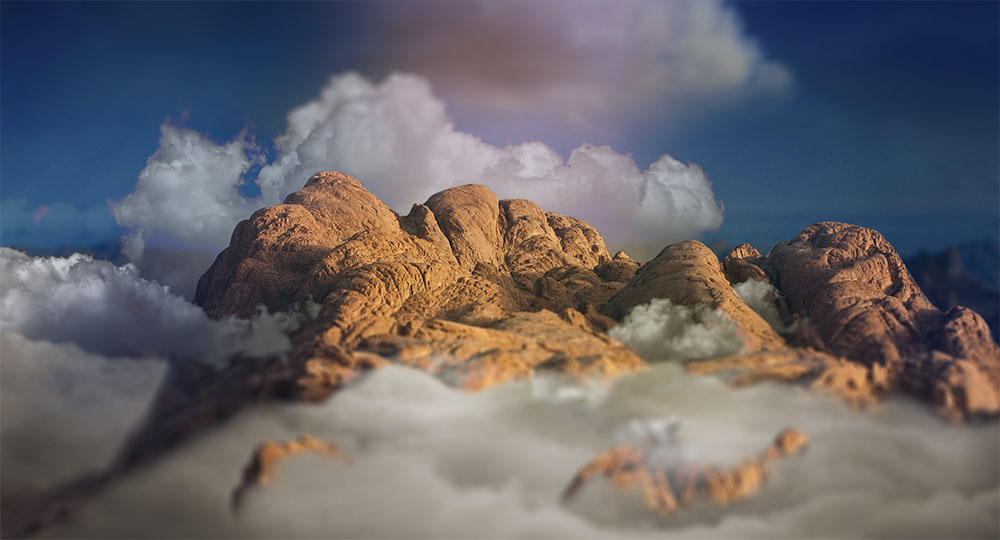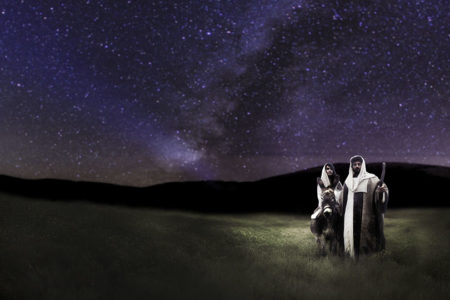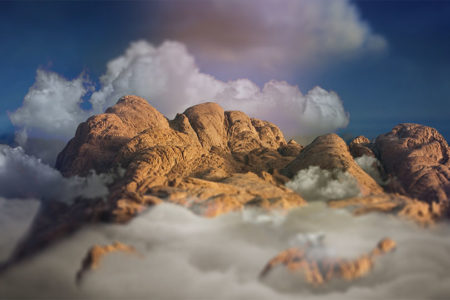The Shekinah Glory
God has always wanted to dwell physically among His people. And He clearly demonstrated that fact to the children of Israel.
As I look at the world and the terrible things people do, I will never understand why God loves us and wants to dwell among us. The fact that a Jewish virgin bore the divine Messiah of Israel is a miracle. But that God wanted to come to Earth is an even bigger one, to my mind.
At Christmastime, we celebrate the day “the Word [Jesus] became flesh and dwelt among us” (Jn. 1:14). But it’s also a good time to remember that God dwelt with humanity prior to Christ’s incarnation, when He revealed Himself to ancient Israel in the form of the Shekinah Glory.
Much confusion always has surrounded the Shekinah Glory. Twelfth-century Jewish philosopher Maimonides believed the Shekinah was “a distinct entity” from God, “a light created to be an intermediary between God and the world.”1 Today, ministries like Bethel Church in Redding, California, claim God’s presence visits in the form of gold dust, “angel” feathers, and what some refer to as a “glory cloud” hovering above Bethel’s congregation.2
None of these views is biblical. Maimonides erroneously believed God was separate from His glory; and gold dust and angel feathers are histrionics designed to play on people’s emotions. Church Age believers have no need for supposed manifestations of God’s presence because we already have the very Spirit of God indwelling us (Rom. 8:9–10).
What, then, is the Shekinah Glory?
The word shekinah means “the dwelling,”3 a term used throughout Scripture to describe God’s presence with His people (Ex. 25:8; 1 Ki. 6:13). The Shekinah Glory was the literal, physical manifestation of God dwelling among the Jewish nation prior to the coming of the Messiah.
Pillar and Cloud
One of the first images of God dwelling with His Chosen People involves the Exodus from Egypt, around 1400 BC.
After Pharaoh grudgingly permitted his Israelite slaves to leave Egypt, they journeyed from Ramses to Succoth to Etham. Leading the caravan was God Himself, who “went before them by day in a pillar of cloud . . . and by night in a pillar of fire to give them light,” so they could travel by day and by night (Ex. 13:21).
Although Pharaoh subsequently pursued the Israelites, the Lord directed them to march forward into the Red Sea. As they walked, “the Angel of God, who went before the camp of Israel, moved and went behind them; and the pillar of cloud went from before them and stood behind them” (14:19). The “Angel of God” was God Himself, manifested in His Shekinah Glory, a pillar that cast darkness on the Egyptians but “gave light by night” to Israel (v. 20).
As the Egyptians pursued the Jewish people into the sea, the Lord “looked down” (v. 24) on them from the cloud of the Shekinah and confused the Egyptian army. “And He took off their chariot wheels, so that they drove them with difficulty; and the Egyptians said, ‘Let us flee from the face of Israel, for the LORD fights for them against the Egyptians’” (v. 25).
God then moved the waters to “come back upon the Egyptians, on their chariots, and on their horsemen,” while guiding Israel “on dry land in the midst of the sea” (vv. 26, 29).
It was God’s presence via the Shekinah Glory that caused Israel to see “the great work which the LORD had done in Egypt; so the people feared the LORD, and believed the LORD and His servant Moses” (v. 31).
In the Wilderness
Although Israel experienced God’s great power and revelation through the Shekinah Glory, the Israelites still sinned against Him. Shortly after reading verse 31 that speaks of the nation’s belief in the Lord, we read, “The people complained against Moses” (15:24). Like Church Age believers, Israel clearly needed God’s presence more than momentarily.
Throughout their four-decades-long journey through the Sinai wilderness, God stayed with His Chosen People. Initially, Moses pitched a “tabernacle of meeting” (33:7). All eyes watched as he entered it, for “the pillar of cloud descended and stood at the door of the tabernacle, and the LORD talked with Moses” (v. 9). Then “all the people rose and worshiped, each man in his tent door” (v. 10).
The Shekinah Glory also appeared when God gave Moses the Law. After Moses cut two stone tablets and climbed Mount Sinai, “the LORD descended in the cloud and stood with him there, and proclaimed the name of the LORD” (34:5).
Many of the commandments God gave through the Shekinah Glory revolved around the construction of the Tabernacle, which replaced the tent of meeting. When the Tabernacle was completed, the “cloud” covered it, “and the glory of the LORD filled the tabernacle” (40:34). It was in the Tabernacle that the Israelites worshiped the Lord, and “the cloud of the LORD was above the tabernacle by day, and fire was over it by night, in the sight of all the house of Israel, throughout all their journeys” (v. 38). The nation would only proceed to the next campsite “whenever the cloud was taken up from above the tabernacle” (v. 36).
In the Temple
Generations after Israel left Egypt and took possession of the Promised Land, King David wanted to build a house for the Lord in Jerusalem. The Lord, however, had David’s son Solomon build it—a magnificent Temple on Mount Moriah.
At the dedication service, the Lord’s house “was filled with a cloud, so that the priests could not continue ministering because of the cloud; for the glory of the LORD filled the house of God” (2 Chr. 5:13–14).
The Shekinah Glory of God that had led the nation out of Egypt, through the wilderness, and into the land God had promised the Jewish people forever came to rest in the Temple. Like the Tabernacle before it, the Temple would have been an ordinary building without the Lord’s presence. God’s Shekinah Glory made it holy.
Eventually, the Shekinah left the Temple, exiting through the Eastern Gate (Ezek. 10:18–19). God was about to judge Israel for its sin, allowing the Babylonians to burn Jerusalem and the Temple to the ground in 586 BC. His visible presence would not return for almost 600 years.
The Night God Returned
One special night in the Middle East, a Baby came into the world. Not just any baby: “The Word became flesh and dwelt among us, and we beheld His glory, the glory as of the only begotten of the Father, full of grace and truth” (Jn. 1:14).
God again was dwelling physically with humanity—this time as a human so that He could become the perfect Lamb of God: the Messiah of Israel, who would become the final sacrifice for Israel’s sin but who also would save from perdition every soul on Earth who placed his or her faith in Him. He came in fulfillment of prophecies He gave the Jewish people hundreds of years earlier, telling them exactly what He would do (Isa. 53).
Prior to the Messiah’s arrival, the Shekinah Glory manifested the literal, physical presence of God among the Jewish nation. Since Christ’s birth, Jesus has been “the brightness of His glory and the express image of His person, and upholding all things by the word of His power” (Heb. 1:3).
Someday Jesus will return, not as the Lamb of God, but as the Lion of Judah. And God will dwell with man forever. Although I still will never understand why a holy God would want to do such a thing, I am overjoyed that He does.
ENDNOTES
-
-
- Kaufmann Kohler and Ludwig Blau, JewishEncyclopedia.com (tinyurl.com/Shekinah-1), s.v. “shekinah.”
- Joe Carter, “9 Things You Should Know About the Bethel Church Movement,” thegospelcoalition.org, September 29, 2018 (tinyurl.com/GC-bethel).
- Kohler and Blau.
-









Wow! There’s so much to unpack here. Thanks for whetting my appetite.
Ty — Thanks for your article on the Shekinah Glory– at Christmas. I wondered how does the revelation of the “Glory of the Lord that shone round about them and they were sore afraid” to the shepherds fit into this in Luke 2:9?
You are welcome, Bruce. I think it’s very likely that the “glory of the Lord” spoken of in Luke 2:9 was the Shekinah.
Your article on the Shekinah Glory hit me like a ton of bricks. I never gave much thought to God wanting to dwell with us but it makes perfect sense now. God walked with Adam in the garden in the beginning before sin came in. Even after then why wouldn’t God want to find a way to live with us His creation. There are so many more stories in the Bible where God came to dwell with those who loved Him. In spite of our sin God still loves us and you have brought that home to me so much more than ever before. I will look for that even more when I read my Bible. It is something I always knew but now it opens to so much more. Thank you for your article. You said it just right to make my heart happy and blessed. Carry on young man!
It’s so good to hear that this piece was an encouragement/reminder to you, Kathy! Thanks for your kinds words.
Oh that will be glory for me when by His grace l shall look on His face . To be in the presence of God,s Glory one day is beyond anything we can imagine or think . What a wonderful God that would share His Glory with us sinners.
I’m currently working on a message about change and the Holy Spirit, Shekinah Glory and the Indwelling of the Hole Spirit. So thankful for the leading of God. This article and one other is really going to tie everything together that God has given me.
That’s great, Jennie! I hope it helps.
Amen, Lucille!
Jesus is the light of the world, as he said about himself. “…I am the light of the world: he that followeth me shall not walk in darkness, but shall have the light of life…” At night, in the Temple, Jesus taught his disciples this truth as the Levite attendants lit the lampstands, so that as He spoke spiritually, his followers had a visible lesson, too. God still has lampstands in his service. “…These are the two olive trees, and the two candlesticks standing before the God of the earth…”
The article on Shekinah Glory came in perfect timing as my sisters and I are studying Haggai. Haggai encouraged the Israelites to get to work and build a temple as part of Gods plan…We learned of the shekinah glory having left Solomon’s temple before its destruction, but He was still “among” the faithful. Today, the believer in Jesus Christ has the Holy Spirit “within” him and that one day, there will be a millennial temple with the full glory of our King, Jesus Christ! Haggai 2: 4-9
Absolutely, Caryl. Glad to hear the article came at just the right time. May the Lord bless you.
The articles in Israel My Glory please my soul so much I exhaust the entire issue the same day it is received.
I’m so glad to hear that, Mel. Praise the Lord!